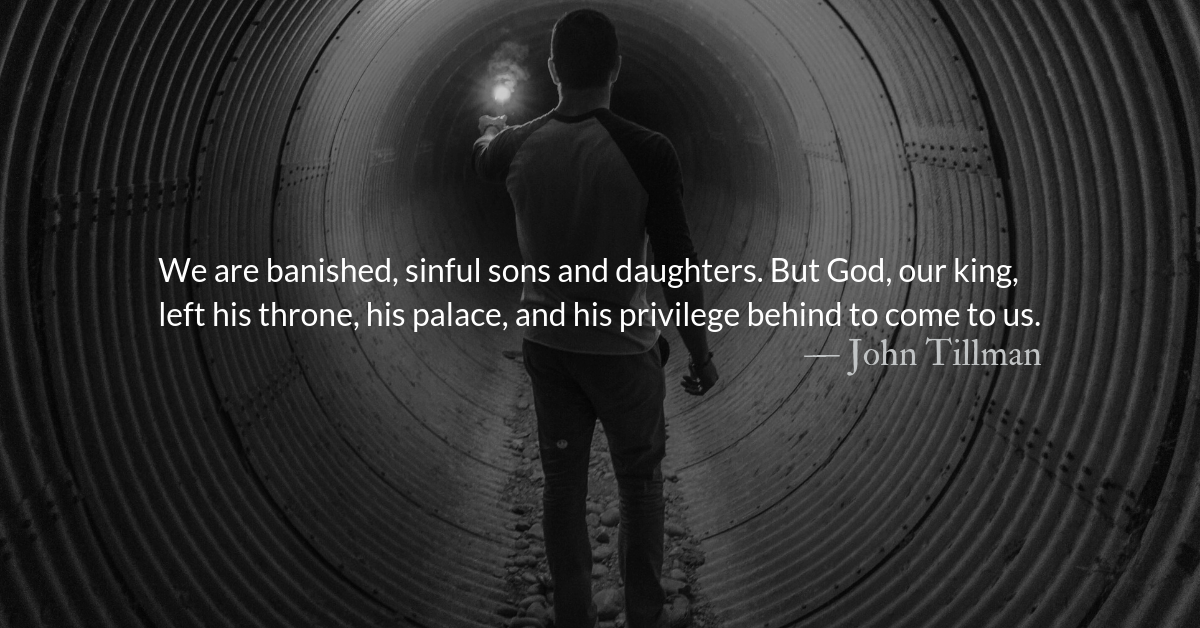Scripture Focus: 2 Samuel 14:14
Like water spilled on the ground, which cannot be recovered, so we must die. But that is not what God desires; rather, he devises ways so that a banished person does not remain banished from him.
Reflection: Bringing Back the Banished
By John Tillman
Joab is not remembered in the scriptures as a merciful man. If anything, he is David’s button man—eliminating David’s enemies while maintaining plausible deniability. Joab is a ruthless tactician, delivering to David cities to conquer and the corpses of his enemies. Joab uses any means necessary behind the scenes and allows David’s hands, to everyone’s eyes but God’s, to remain clean.
So it is somewhat surprising that the merciful, theatrical errand of reconciliation detailed in 2 Samuel fourteen is orchestrated by Joab to bring back David’s banished son, Absalom. It is unusual that the ruthless black-ops commander who assassinated Abner against David’s wishes would pursue this mission. It is a mission whose outcome is doomed.
Before long, it is clear that Absalom has not come home for reconciliation, but rebellion. Eventually, it is Joab who, against David’s specific orders, murders Absalom, the hapless rebel, as he hangs in a tree, defenseless.
It is helpful for us to contrast David’s grudging approval for Absalom’s return with Paul’s joyful and full acceptance of those involved in a conflict within the Corinthian church.
David says of Absalom, “He must not see my face.” He allows Absalom’s return to the city, but not to the family. Yet Paul, speaks tenderly of relationships not only fully restored, but strengthened. “And his [Titus’s] affection for you is all the greater when he remembers that you were all obedient, receiving him with fear and trembling. I am glad I can have complete confidence in you.”
We are banished, sinful sons and daughters. But God, our king, was not theatrically cajoled into bringing us back. It was always his plan. Our king didn’t grant us partial forgiveness, keeping us from coming to his palace or being in his presence. He left his throne, his palace, and his privilege behind to come to us. By rights, we should die rebels, as Absalom did. But our king died in our place, hung on the tree we were doomed for. Our king does not merely return the banished but redeems them.
The message of the gospel is not that we are grudgingly allowed back home while denied the privileges of family. Christ is not our parole officer, but our brother. Through him, we become fully restored sons and daughters of his kingdom.
Divine Hours Prayer: The Request for Presence
Let my cry come before you, O Lord; give me understanding, according to your word.
Let my supplication come before you; deliver me, according to your promise. — Psalm 119.169-170
– From The Divine Hours: Prayers for Summertime by Phyllis Tickle.
Today’s Readings
2 Samuel 14 (Listen – 5:57)
2 Corinthians 7 (Listen – 2:58)
Thank You!
Thank you to our donors who support our readers by making it possible to continue The Park Forum devotionals. This year, The Park Forum audiences opened 200,000 free, and ad-free, devotional content. Follow this link to join our donors with a one-time or a monthly gift.
Read more about Liquid Wrath and Liquid Forgiveness :: Readers’ Choice
The cup of God’s wrath is taken for us by Christ. He begs not to drink it, and yet he does. Leaving us not a drop to taste after him.
Read more about Steeped in Sin :: Readers’ ChoiceWe need Jesus because only his righteousness is the antidote to the radiation poisoning of rebellion.







